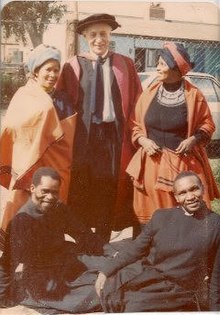Clement Martyn Doke was a South African linguist working mainly on African languages. Realizing that the grammatical structures of Bantu languages are quite different from those of European languages, he was one of the first African linguists of his time to abandon the Euro-centric approach to language description for a more locally grounded one. A most prolific writer, he published a string of grammars, several dictionaries, comparative work, and a history of Bantu linguistics.

Carl Friedrich Michael Meinhof was a German linguist and one of the first linguists to study African languages.
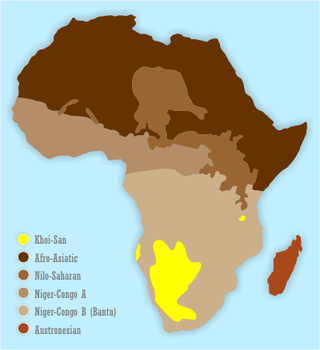
The Khoisan languages are a number of African languages once classified together, originally by Joseph Greenberg. Khoisan is defined as those languages that have click consonants and do not belong to other African language families. For much of the 20th century, they were thought to be genealogically related to each other, but this is no longer accepted. They are now held to comprise three distinct language families and two language isolates.
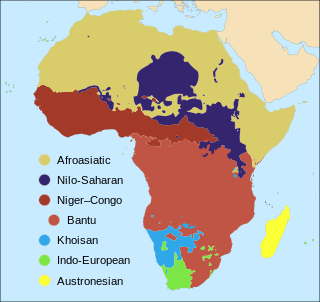
The total number of languages natively spoken in Africa is variously estimated at between 1,250 and 2,100, and by some counts at over 3,000. Nigeria alone has over 500 languages, one of the greatest concentrations of linguistic diversity in the world. The Languages of Africa belong to many distinct language families, among which the largest are:
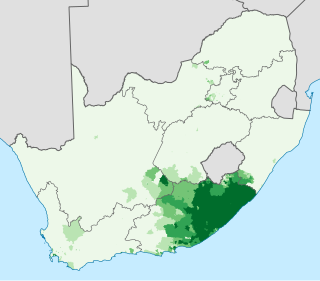
Xhosa, formerly spelled Xosa and also known by its local name isiXhosa, is a Nguni language and one of the official languages of South Africa and Zimbabwe. Xhosa is spoken as a first language by approximately 10 million people and as a second language by another 11 million, mostly in South Africa, particularly in Eastern Cape, Western Cape, Northern Cape and Gauteng, and also in parts of Zimbabwe and Lesotho. It has perhaps the heaviest functional load of click consonants in a Bantu language, with one count finding that 10% of basic vocabulary items contained a click.
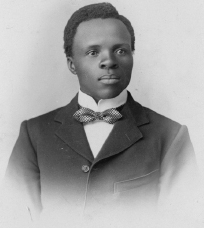
Solomon Tshekisho Plaatje was a South African intellectual, journalist, linguist, politician, translator and writer. Plaatje was a founding member and first General Secretary of the South African Native National Congress (SANNC), which became the African National Congress (ANC). The Sol Plaatje Local Municipality, which includes the city of Kimberley, is named after him, as is the Sol Plaatje University in that city, which opened its doors in 2014.
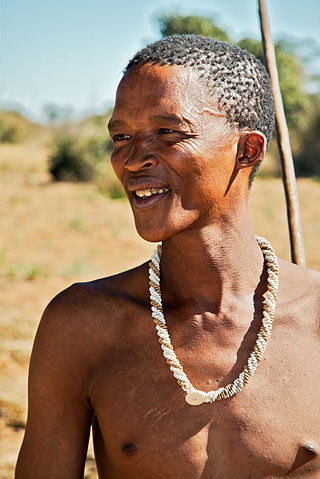
KhoisanKOY-sahn, or Khoe-Sān, is a catch-all term for those indigenous peoples of Southern Africa who do not speak one of the Bantu languages, combining the Khoekhoen and the Sān peoples. Khoisan populations speak click languages and are considered to be the historical (pre-Bantu) communities in the South African Cape region, through to Namibia, where Khoekhoe populations of Nama and Damara people are prevalent groups, and Botswana.

Hottentot is a term that was historically used to refer to the Khoekhoe, indigenous nomadic pastoralists of South Africa.
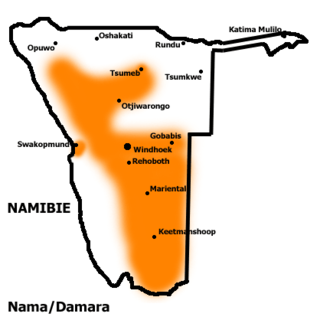
The Khoekhoe language, also known by the ethnic terms Nama (Namagowab), Damara (ǂNūkhoegowab), or Nama/Damara and formerly as Hottentot, is the most widespread of the non-Bantu languages of Southern Africa that make heavy use of click consonants and therefore were formerly classified as Khoisan, a grouping now recognized as obsolete. It belongs to the Khoe language family, and is spoken in Namibia, Botswana, and South Africa primarily by three ethnic groups: Namakhoen, ǂNūkhoen, and Haiǁomkhoen.
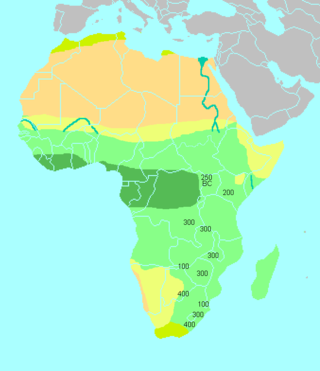
The Bantu expansion is a hypothesis about the history of the major series of migrations of the original Proto-Bantu-speaking group, which spread from an original nucleus around Central Africa across much of sub-Saharan Africa. In the process, the Proto-Bantu-speaking settlers displaced, eliminated or absorbed pre-existing hunter-gatherer and pastoralist groups that they encountered.

Khwe is a dialect continuum of the Khoe family of Namibia, Angola, Botswana, South Africa, and parts of Zambia, with some 8,000 speakers.
Kalanga, or TjiKalanga, is a Bantu language spoken by the Kalanga people in Botswana and Zimbabwe. It has an extensive phoneme inventory, which includes palatalised, velarised, aspirated and breathy-voiced consonants, as well as whistled sibilants.

The Tuu languages, or Taa–ǃKwilanguages, are a language family consisting of two language clusters spoken in Botswana and South Africa. The relationship between the two clusters is not doubted, but is distant. The name Tuu comes from a word common to both branches of the family for "person".
The Khoi languages are the largest of the non-Bantu language families indigenous to Southern Africa. They were once considered to be a branch of a Khoisan language family, and were known as Central Khoisan in that scenario. Though Khoisan is now rejected as a family, the name is retained as a term of convenience.
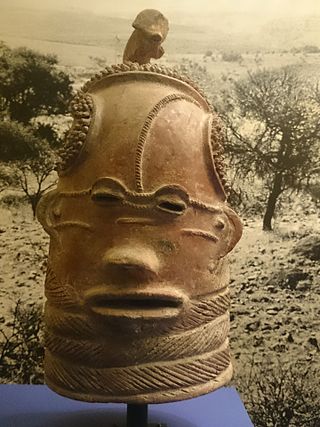
South African Bantu-speaking peoples represent the overwhelming majority ethno-racial group of South Africans. Occasionally grouped as Bantu, the term itself is derived from the English word “people", common to many of the Bantu languages. The Oxford Dictionary of South African English describes “Bantu”, when used in a contemporary usage and or racial context as "obsolescent and offensive", because of its strong association with the “white minority rule” with their apartheid system, however, Bantu is used without pejorative connotations in other parts of Africa and is still used in South Africa as the group term for the language family.
The Prehistory of South Africa lasts from the Middle Stone Age until the 17th century. Southern Africa was first reached by Homo sapiens before 130,000 years ago, possibly before 260,000 years ago. The region remained in the Late Stone Age until the first traces of pastoralism were introduced about 2,000 years ago. The Bantu migration reached the area now South Africa around the first decade of the 3rd century, over 1800 years ago. Early Bantu kingdoms were established by the 11th century. First European contact dates to 1488, but European colonization began in the 17th century.
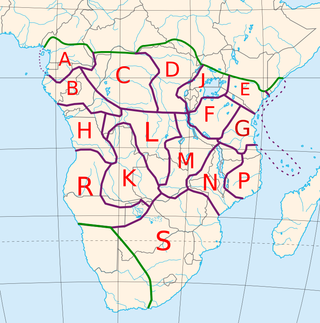
The Bantu peoples, or Bantu, are an ethnolinguistic grouping of approximately 400 distinct Native African ethnic groups who speak Bantu languages, consisting of some 600 languages with varied mutual intelligibility. The languages are native to 24 countries spread over a vast area from Central Africa to Southeast Africa and into Southern Africa. There are several hundred Bantu languages. Depending on the definition of "language" or "dialect", it is estimated that there are between 440 and 680 distinct languages. The total number of speakers is in the hundreds of millions, ranging at roughly 350 million in the mid-2010s. About 60 million speakers (2015), divided into some 200 ethnic or tribal groups, are found in the Democratic Republic of the Congo alone.

Jonathan Westphal is an academic philosopher working on the philosophy of mind, metaphysics, philosophy of science, logic and philosophy of language and aesthetics. More recently he has become interested in issues in the philosophy of time, and in the understanding of human freedom. In the history of philosophy, he has worked mostly on Wittgenstein and Leibniz. He lives in Hamden, Connecticut, and works as a private tutor in philosophy.
Archibald Norman Tucker was a Cape Colony-born linguist specializing in Bantu languages. He earned his MA degree at the University of Cape Town. He did some study of Bantu languages in southern Africa and also made a trip to Sudan to study languages there. He worked as Linguistic Expert of non-Arabic languages for the Sudan Government from 1929 to 1931. He later moved to England in 1931. In London, Tucker studied under Alice Werner and Daniel Jones, earning his Ph.D. at University College London. Later he studied for a short time under Carl Meinhof in Hamburg.
